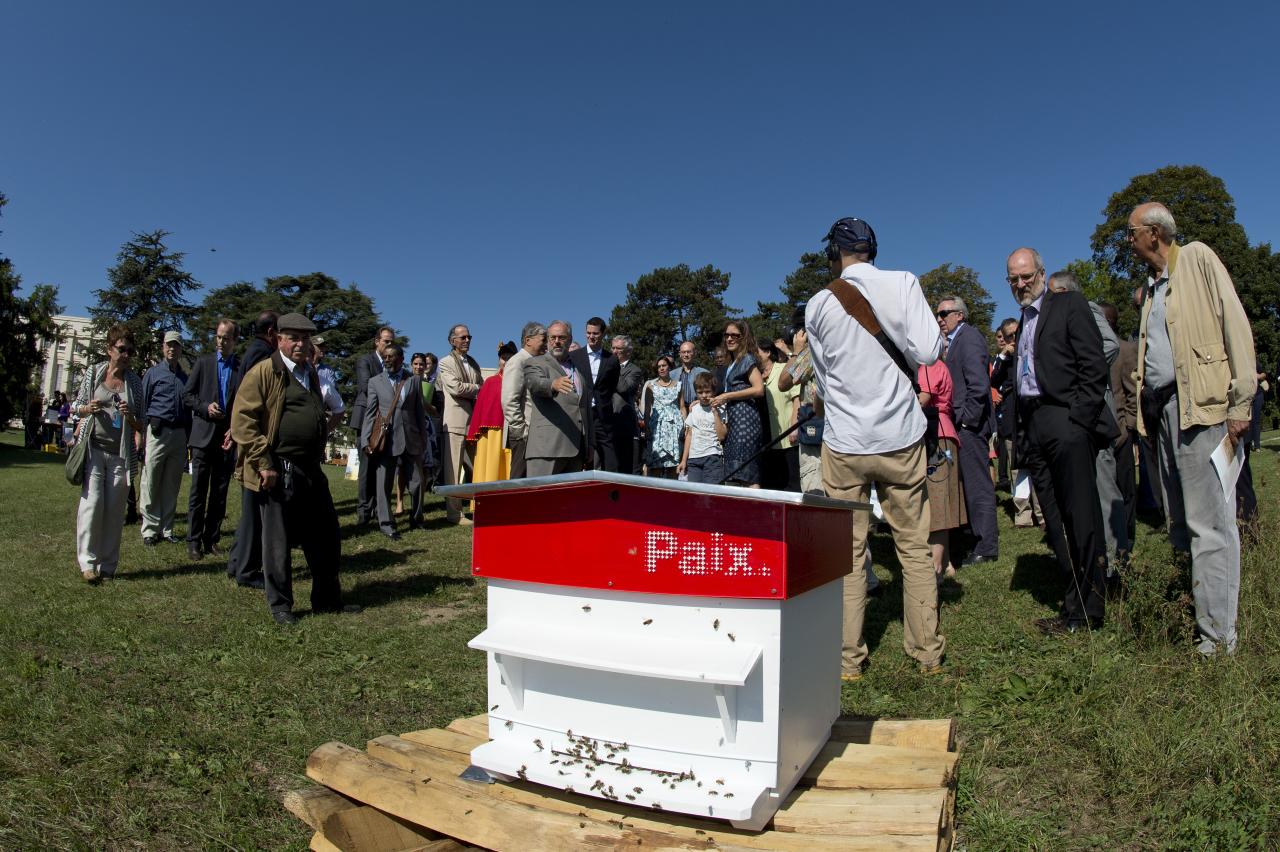Breadcrumb

Bees create a buzz at Palais des Nations

While visitors are used to seeing majestic peacocks roaming the gardens of the Palais des Nations, these are not the only masters of the Ariana Park. Around them, thousands of bees also forage more discreetly in the gardens. On this World Bee Day, celebrated on 20 May and dedicated to these pollinators that are essential to biodiversity and the survival of ecosystems, Pierre Duperret, a gardener who takes care of the 10 bee hives in the heart of the Ariana Park, tells us more about them.
For 17 years, Mr. Duperret has been passionate about the maintenance of the gardens of the Palais des Nations. In the heart of this lush green setting and facing the Lac Léman are 10 bee hives donated by Switzerland on 10 September, 2012, to celebrate the tenth anniversary of its accession to the United Nations.
Despite the current situation because of COVID-19, the maintenance of the Ariana Park and the 10 hives continues in stride. In the Park, up to 50,000 bees live inside each hive, and caring for them requires work and patience.
Bees are essential for pollination, Mr. Duperret says, and therefore vital to humanity. Honeybees pollinate about 20 per cent of flowers, including fruit trees and vegetables.
Healthy bees
Indeed, pollination contributes to food security and is essential for the survival of the world’s ecosystems. Nearly 90 per cent of the world’s wild flowering plant species depend entirely, or at least in part, on animal pollination, along with more than 75 per cent of food crops and 35 per cent of agricultural land. Unfortunately, bees, among the most important pollinators, are increasingly under threat from human activities.
For Mr. Duperret, pesticides, pollution and global warming pose the biggest challenges for bees. He believes people everywhere must play a role in the protection and preservation of bees, for example by changing their consumer habits to decrease pollution, and by limiting the use of insecticides.
It was precisely to raise the world’s awareness of the importance of bees that Slovenia, in 2017, led the process within the United Nations to adopt a resolution designating 20 May as World Bee Day. According to Klemen Ponikvar, Counsellor at the Permanent Mission of Slovenia in Geneva, nearly 10,000 Slovenians have bee hives at home. He is proud that the second most common bee in the world - the Carniolan bee - takes its name from a region of Slovenia. "They are also found in the hives of the Palais des Nations," he says.
At the Palais des Nations, Mr. Duperret watches over the bees carefully, in close cooperation with the Geneva Beekeeping Federation, which regularly checks the hives to ensure the health of the bees. Its experts can intervene in case of problems. The Federation is also responsible for collecting the honey in the hives.
The gift of honey
Mr. Duperret is proud of the work of the bees at the Palais des Nations. Last year, the Swiss Confederation and the United Nations Office at Geneva shared 96 kilograms of honey produced by these tireless little workers.
The Director-General of the United Nations Office at Geneva, Tatiana Valovaya, receives some of the honey pots, which she offers as a welcome gift to the new Permanent Representatives of the Permanent Missions to the United Nations Office at Geneva, when they come to present their credentials, as well as to other distinguished guests.
A tribute to the host country, Switzerland, but also to the work of the bees that are active all day outside the windows of her office in the Ariana Park.
